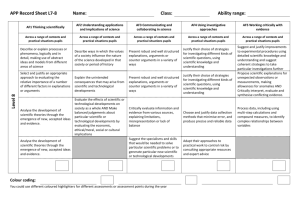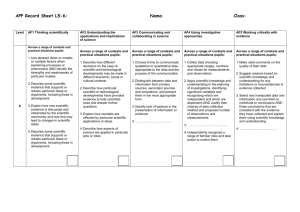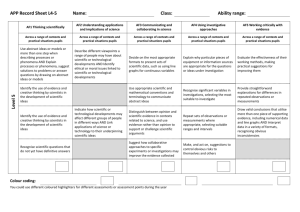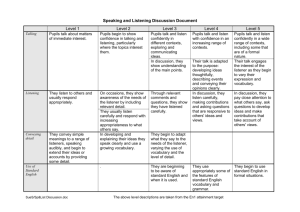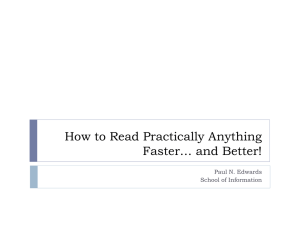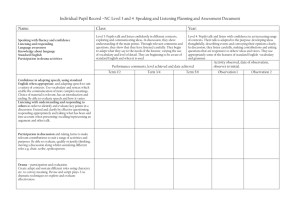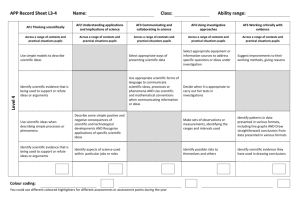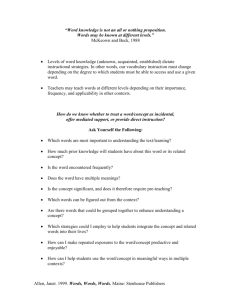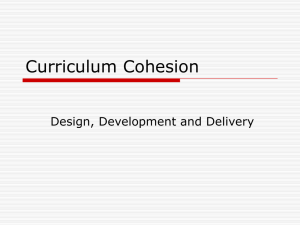Level 7
advertisement
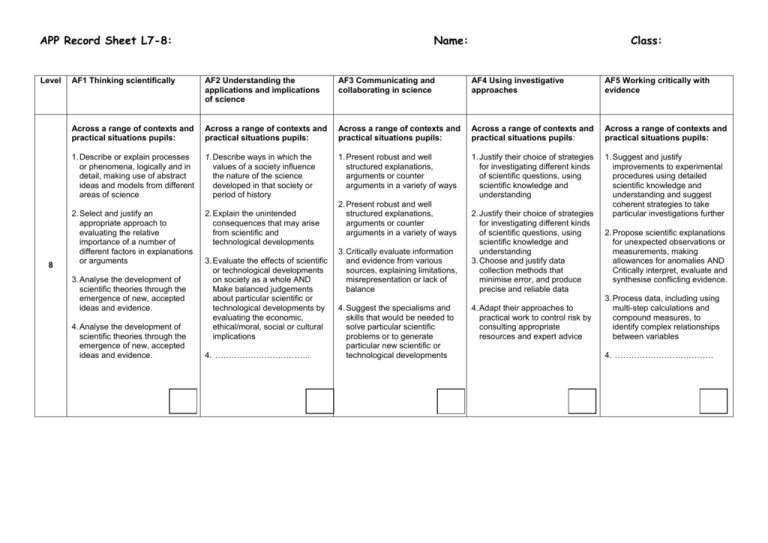
APP Record Sheet L7-8: Level 8 Name: Class: AF1 Thinking scientifically AF2 Understanding the applications and implications of science AF3 Communicating and collaborating in science AF4 Using investigative approaches AF5 Working critically with evidence Across a range of contexts and practical situations pupils: Across a range of contexts and practical situations pupils: Across a range of contexts and practical situations pupils: Across a range of contexts and practical situations pupils: Across a range of contexts and practical situations pupils: 1. Describe or explain processes or phenomena, logically and in detail, making use of abstract ideas and models from different areas of science 1. Describe ways in which the values of a society influence the nature of the science developed in that society or period of history 1. Present robust and well structured explanations, arguments or counter arguments in a variety of ways 1. Justify their choice of strategies for investigating different kinds of scientific questions, using scientific knowledge and understanding 2. Select and justify an appropriate approach to evaluating the relative importance of a number of different factors in explanations or arguments 2. Explain the unintended consequences that may arise from scientific and technological developments 1. Suggest and justify improvements to experimental procedures using detailed scientific knowledge and understanding and suggest coherent strategies to take particular investigations further 3. Analyse the development of scientific theories through the emergence of new, accepted ideas and evidence. 4. Analyse the development of scientific theories through the emergence of new, accepted ideas and evidence. 3. Evaluate the effects of scientific or technological developments on society as a whole AND Make balanced judgements about particular scientific or technological developments by evaluating the economic, ethical/moral, social or cultural implications 4. …………………………….. 2. Present robust and well structured explanations, arguments or counter arguments in a variety of ways 3. Critically evaluate information and evidence from various sources, explaining limitations, misrepresentation or lack of balance 4. Suggest the specialisms and skills that would be needed to solve particular scientific problems or to generate particular new scientific or technological developments 2. Justify their choice of strategies for investigating different kinds of scientific questions, using scientific knowledge and understanding 3. Choose and justify data collection methods that minimise error, and produce precise and reliable data 4. Adapt their approaches to practical work to control risk by consulting appropriate resources and expert advice 2. Propose scientific explanations for unexpected observations or measurements, making allowances for anomalies AND Critically interpret, evaluate and synthesise conflicting evidence. 3. Process data, including using multi-step calculations and compound measures, to identify complex relationships between variables 4. ……………………………… Level AF1 Thinking scientifically AF2 Understanding the applications and implications of science AF3 Communicating and collaborating in science AF4 Using investigative approaches AF5 Working critically with evidence Across a range of contexts and practical situations pupils: Across a range of contexts and practical situations pupils: Across a range of contexts and practical situations pupils: Across a range of contexts and practical situations pupils: Across a range of contexts and practical situations pupils: 1. Make explicit connections between abstract ideas and/or models in explaining processes or phenomena 1. Suggest ways in which scientific and technological developments may be influenced AND Suggest economic, ethical/moral, social or cultural arguments for and against scientific or technological developments 1. Effectively represent abstract ideas using appropriate symbols, flow diagrams and different kinds of graphs in presenting explanations and arguments 1. Formulate questions or ideas that can be investigated by synthesising information from a range of sources 1. Explain ways of modifying working methods to improve reliability 2. Employ a systematic approach in deciding the relative importance of a number of scientific factors when explaining processes or phenomena 7 3. Explain the processes by which ideas and evidence are accepted or rejected by the scientific community 4. Explain how different pieces of evidence support accepted scientific ideas or contribute to questions that science cannot fully answer. 2. Explain how creative thinking in science and technology generates ideas for future research and development 3. Explain how scientific discoveries can change worldviews 2. Effectively represent abstract ideas using appropriate symbols, flow diagrams and different kinds of graphs in presenting explanations and arguments 3. Explain how information or evidence from various sources may been manipulated in order to influence interpretation 4. ……………………………. 4. Explain how scientists with different specialisms and skills have contributed to particular scientific or technological developments 2. Identify key variables in complex contexts, explaining why some cannot readily be controlled and planning appropriate approaches to investigations to take account of this 3. Explain how to take account of sources of error in order to collect reliable data 4. Recognise the need for risk assessments and consult, and act on, appropriate sources of information 2. Assess the strength of evidence, deciding whether it is sufficient to support a conclusion 3. Explain how data can be interpreted in different ways and how unexpected outcomes could be significant AND Identify quantitative relationships between variables, using them to inform conclusions and make further predictions. 4. …………………………………. BL IE Overall assessment (tick one box only) Low 7 Secure 7 High 7 Low 8 Secure 8 High 8
